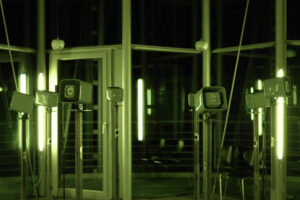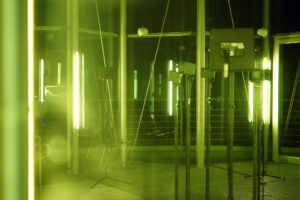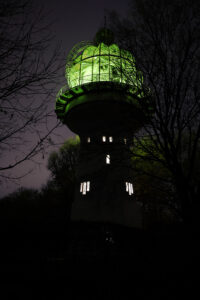I am a transmedia composer. By transferring concepts into different media, I create an ambiguous experience. I want to uncover the breaks and gaps in hierarchies and enable a new perspective in concerts, performances and sound installations. By working far away from concert halls - for example in public swimming pools, water towers, research institutes, museums or rural meadows - I am looking for a multi-layered audience.
Feel free to contact me.
The 16-channel sound installation ist about the (in)visibility of people in a society and the finding of one’s own (political) voice. In its treatment, the installation focuses on the polarizing phenomenon of protest suicide through self-immolation.
The sound material is limited to the human voice. Through subtle interaction, the audience experiences in the electroacoustic and compositional confrontation how a voice is found, concretized or dissolves in the ensemble of loudspeakers.
Futher informations
Date/location
19 – 29 January 2023 Thurs. – Sun. 16.00 – 21.00 h Weltkunstzimmer Düsseldorf
2 – 4 December 2022 16 – 21.00 at LTS4, Lichtturm Solingen
Credits
A sound installation by Krux; Concept, Elsa Weiland, Joseph Baader, Vincent Stange; text and direction, Elsa Weiland; composition, Joseph Baader, Vincent Stange; Voice, Hildegard Meier; Video documentation, Robert Vater
Partners
Château d’Eau VI – LTS4 at the Lichtturm Solingen.
With the kind support of Weltkunstzimmer Düsseldorf.
In cooperation with studiobühneköln.
Supported by
Kunststiftung NRW, Bezirksvertretung Flingern, Düsseltal, Kunst- und Kulturstiftung der Stadtsparkasse Düsseldorf, FormatArt e.V.
Press
„Gerade in Zeiten, in denen die Proteste von Aktivisten stärker werden, habe auch diese Installation einen aktuellen Bezug. Selbst bis heute nutzen Aktivisten diese extreme Form des Protests, um auf ihre Forderungen aufmerksam zu machen – zuletzt etwa im Arabischen Frühling oder im vergangenen April in New York, als sich der Anwalt und Klimaaktivist Wynn Bruce ansteckte und im Protest sein Leben verlor.“
Rheinische Post Düsseldorf (Leonie Miß), 13.01.2023
Context
„Angesichts dessen, dass unsere Völker am Rand der Hoffnungslosigkeit stehen, habe ich mich entschlossen, meinen Protest auszudrücken und die Leute dieses Landes wach zu rütteln. Meine Forderung: Abschaffung der Zensur (Jan Palach, 1969); Gleichberechtigung der Frau (Sahar Khodayari, 2019); Kampf gegen Rassismus und gleiche Rechte für Ausländer*innen (Semra Ertan, 1982); Beendigung des Krieges (Malachi Ritscher, 2006); Freie Religionsausübung (Thích Quàng Dúnc, 1963); Beendigung des Rüstungswahnsinns (Dietrich Stumpf, 1982), …“
Since the famous case in 1963 of monk Thích Quàng Dúnc, who killed himself to protest discrimination against Buddhists in South Vietnam, self-immolation has become established as a form of political protest. Since 1963, at least 900 people worldwide have burned themselves to death in public places in protest, and the number of unreported cases is estimated to be over 3,000. Although this form of protest is rare, the symbolic and shocking acts condense discourses that are highly relevant and topical for our political and social situation today.
For the fight for visibility – which in the case of self-immolations is waged in its most extreme form with the greatest possible sacrifice of one’s own life – is always also a fight for attention, freedom of expression and the public handling of information. It is a fight for one’s own political participation.
Who are the people who dare to take such a radical step? What circumstances have led them to sacrifice their lives to achieve a political goal? What does it say about a society in which people excruciating self-immolate in public in the hope of visibility? Should their messages even be taken seriously because of the radical form of expression? Or is sacrificing oneself for a higher social goal only used as a cover for one’s own tiredness of life after all?
More info at: https://krux-kollektiv.de







